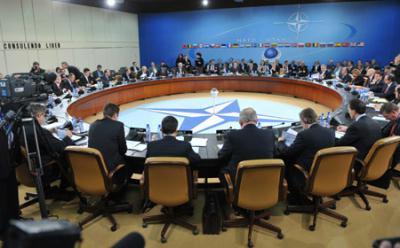NATO allies rally to Obama request with 7,000 more troops for Afghanistan
2009-12-05 08:39 BJT
BRUSSELS, Dec. 4 (Xinhua) -- NATO allies and partner nations rallied Friday to U.S. President Barrack Obama's call for an international military surge in Afghanistan, by adding at least 7,000 troops to the 30,000 fresh U.S. soldiers due to deploy next year in what could be the last chance to stem the rising tide of Taliban violence.
 |
| A meeting of foreign ministers of the NATO-Russia Council is held at the NATO headquarters in Brussels Dec. 4, 2009. (Xinhua/Wu Wei) |
"Despite all the challenges, all the uncertainties and all the casualties, they remain absolutely united about this mission," said NATO Secretary General Anders Fogh Rasmussen after talks with foreign ministers from the 44 nations contributing to the mission in Afghanistan.
The extra international troops, combined with the growing Afghan National Army, will mean the U.S. and its allies will have about 300,000 soldiers on the ground next year, outnumbering the Taliban insurgents by over ten-to-one, according to NATO estimates.
Fogh Rasmussen said the injection of more firepower plus a switch in strategy designed to undermine local support for the Taliban means success is in reach. Obama has set a July 2010 target for international forces to begin a gradual withdrawal and handover to Afghan forces.
However, with public support in many countries skeptical about the chances of success and increasingly opposed to the war, NATO officials are keenly aware that this may be their last chance to get the Afghan strategy right. They know that failure would be a potential fatal blow to NATO credibility that risks Afghanistan emerging as a terrorist haven and a threat to nuclear-armed Pakistan.
Fogh Rasmussen said at least 25 nations have committed to deploy additional troops in 2010. "This is a significant contribution by our NATO partners," said U.S. Secretary of State Hillary Clinton. "I am heartened by the level of additional help we have received."
The international force has been growing steadily in Afghanistan since U.S.-led forces toppled the Taliban regime in 2001. However, they have failed to halt the insurgency as remnants of the Taliban regime that has been reinvigorated by profits from the narcotics trade and recruits from Afghans disillusioned with continued poverty and widespread government corruption.
Related stories
- 20 NATO countries to send troops to Afghanistan 2009-12-04
- NATO allies respond to Obama troop surge in Afghanistan 2009-12-04
- NATO chief: 5000 more troops to Afghanistan 2009-12-03
- Obama sends 30,000 more troops to Afghanistan 2009-12-02
- Obama calls on NATO allies to send more troops to Afghanistan 2009-12-02
- Obama to send 30,000 more troops to Afghanistan, start pullout in July 2011 2009-12-02

 Mail
Mail Share
Share Print
Print


 Video
Video









 2009 China Central Television. All Rights Reserved
2009 China Central Television. All Rights Reserved